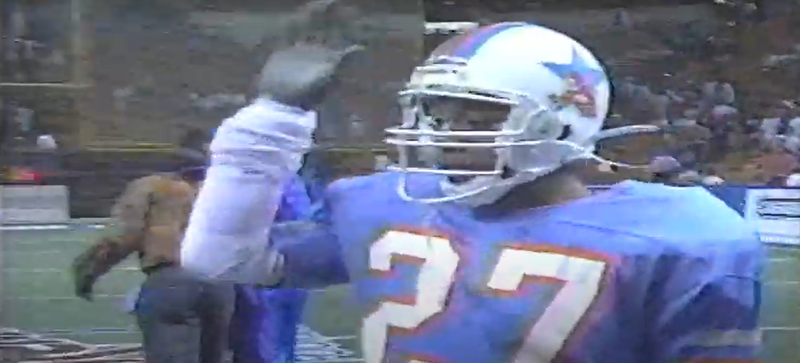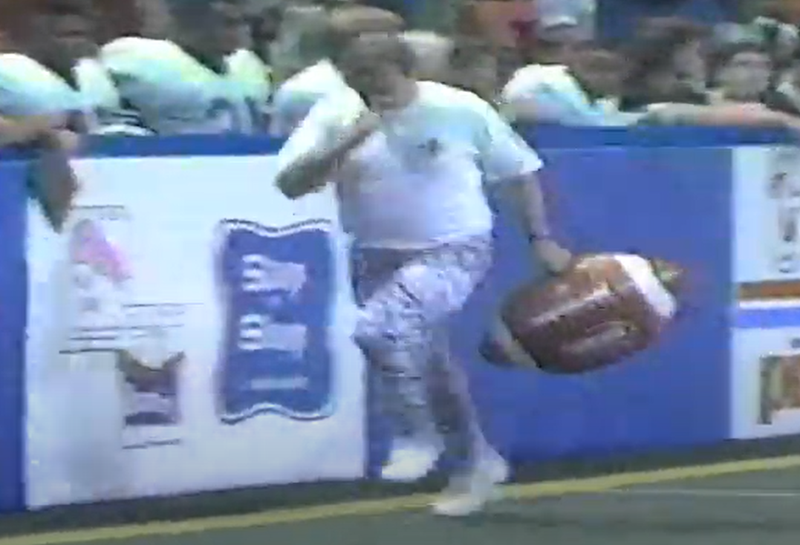
By Zane Miller
On Thursday, July 2nd, 1992, the Cleveland Thunderbolts hosted the Detroit Drive at the Richfield Coliseum in Richfield Township, Ohio, as the teams were headed in vastly different directions at this point in their respective team histories.
Starting with the Drive, they were easily the most successful franchise in Arena Football League history at this point in time, as they had captured three straight ArenaBowl titles from 1988 to 1990. Although they fell in ArenaBowl V to the Tampa Bay Storm in 1991, the Drive were determined to prove themselves once again 1992. This endeavor got off to a rough start as they were upset by the Cincinnati Rockers in the first game of the season, but regained their composure to take a respectable 3-2 record into their game against the Thunderbolts.
Speaking of which, the Thunderbolts were not off to a good start in their brief time in the league, entering as an expansion team in 1991. However, they actually began life as the Columbus Thunderbolts, playing at the then-named Ohio Expo Center Coliseum. Unfortunately, the 1991 Thunderbolts were one of the worst teams in AFL history, as they failed to win a single game in their debut season, though they came remarkably close to pulling off a road upset against the Denver Dynamite before falling in overtime. The Thunderbolts began a fresh start in the Cleveland area for 1992, as the team looked strong in the opening weeks with a 3-0 start to the year. However, just like the 2011 Buffalo Bills, they came crashing back down to Earth in the next few games, and were sitting at 3-2 as they were set to host the Drive.
Quarterback Gilbert Renfroe took the start for the Drive, as he was in his first season as an AFL player after spending the previous season in the Canadian Football League with the Calgary Stampeders, who made it to that year’s Grey Cup before coming up short against the Toronto Argonauts. As for the Thunderbolts, they would send out Major Harris at quarterback, who struggled with Columbus in his first AFL campaign the previous year and was looking to turn his luck around in 1992.
The Drive performed as expected early on, taking a 29-15 halftime lead. However, a pair of heinous blunders by Detroit would put the Thunderbolts right back to within striking distance. An interception by Cleveland’s Phil Poirier would be run back for a touchdown on the first possession of the second half, followed up immediately with yet another Thunderbolts touchdown, this time with the kickoff going off of the net next to the uprights and bouncing back into play. With no one on Detroit able to pick up the ball in time, Cleveland’s Anthony Newsom chased the live ball down and recovered in the end zone, erasing a 14-point deficit in just over five minutes of play. On an amusing note, the extra point try was temporarily stopped due to a large inflatable football somehow ending up on the field. The toy was removed from the field without incident, allowing the Thunderbolts to officially tie the game at 29-29.

The Drive narrowly avoided yet another disaster on the next kickoff as well by fumbling the return. Thankfully for them, this would be a no harm, no foul situation as a Drive player quickly fell on the loose ball. This reaction proved to be vital, as Detroit ended up scoring on the series with running back Broderick Sargent finding the end zone to reclaim a 36-29 lead for the Drive. This was set up by a long passing play from Renfroe to star wide receiver George LaFrance, who will be covered further later on.
Cleveland would not be able to respond on the next possession, as Harris was picked off by linebacker Alvin Rettig to set Detroit up in good position yet again. Although Detroit was not able to capitalize on the opportunity, missing a field goal to keep it at a one-possession game, Thunderbolts head coach Dave Whinham had seen enough of Harris and replaced him with backup signal caller Bobby Bounds for the remainder of the game.
Bounds came out swinging on his opening drive, moving the Thunderbolts downfield to eventually culminate in a touchdown pass to rookie wide receiver Chris Harkness. This score occurred in a rather unconventional way, as the pass was initially tipped up in the air before banking off of the net, falling down into the arms of Harkness for the game-tying TD.
With just over five minutes to play in regulation, Renfroe and company orchestrated another touchdown drive, this time with Renfroe taking it in himself to reclaim the advantage. However, the excitement would be somewhat dampened as the ensuing extra point was no good. This was made even worse by the fact that the Drive had two chances at the PAT, with their first try failing because of a bad snap, though it was wiped off due to a Thunderbolts penalty. The second attempt was missed wide, leading to a 42-36 scoreline as time began to wind down.
The Drive defense would come in to save the day as Cleveland got nothing going on their next possession, prompting them to try an extremely long field goal in desperation as punting was, and is, illegal in the indoor game. The try was, of course, no good, with the missed kick being returned by Detroit to near midfield. This time, the Drive would capitalize on the great field position, as kicker John Langeloh drilled a 27-yarder while the team also drained the clock significantly, taking a 45-36 advantage with just 36 seconds left in the game.
With the desperate situation setting in more and more for the Thunderbolts offense, the team was forced to throw the ball downfield in hopes of possibly having enough time for an onside kick and quick field goal try. However, none of this would happen as Bounds was sacked in the end zone with nine seconds left by Rettig, increasing the Drive lead to 47-36, which is where it would stay as Detroit improved to 4-2, with the Thunderbolts dropping down to 3-3.
LaFrance was the standout offensive player of the game, securing eight catches for 138 yards and two touchdowns. At this point in time, LaFrance already had put together an illustrious career with three titles and an ArenaBowl MVP award, not to mention league MVP honors in both 1989 and 1991. However, he would kick it up a notch with another MVP trophy in ArenaBowl VI, followed by his joining the Tampa Bay Storm which led to two more ArenaBowl titles in 1995 and 1996, with LaFrance being named MVP for the 1995 edition as he remains as the only player to win the game’s MVP award three times.
After the game, the Thunderbolts never regained the magic of their early season success, losing their next three consecutive games. However, somewhat miraculously, they would win the final game of the regular season over the Albany Firebirds to sneak into the playoffs with a 4-6 record, though they would be thwomped by the Orlando Predators 50-12 in the first round.
The Drive, on the other hand, went right back to championship form by winning all four of their remaining games to win the Northern Division. They would then cruise to victory in the postseason with none of their challengers able to keep the contests even remotely close, as Detroit beat the Sacramento Attack in the first round 48-23 before taking down the Dallas Texas 57-14 in the semifinals and doing the same to the Predators 56-38 in ArenaBowl VI.
Second half of game: https://www.youtube.com/watch?v=RytQ7WqZ2FA
Comments